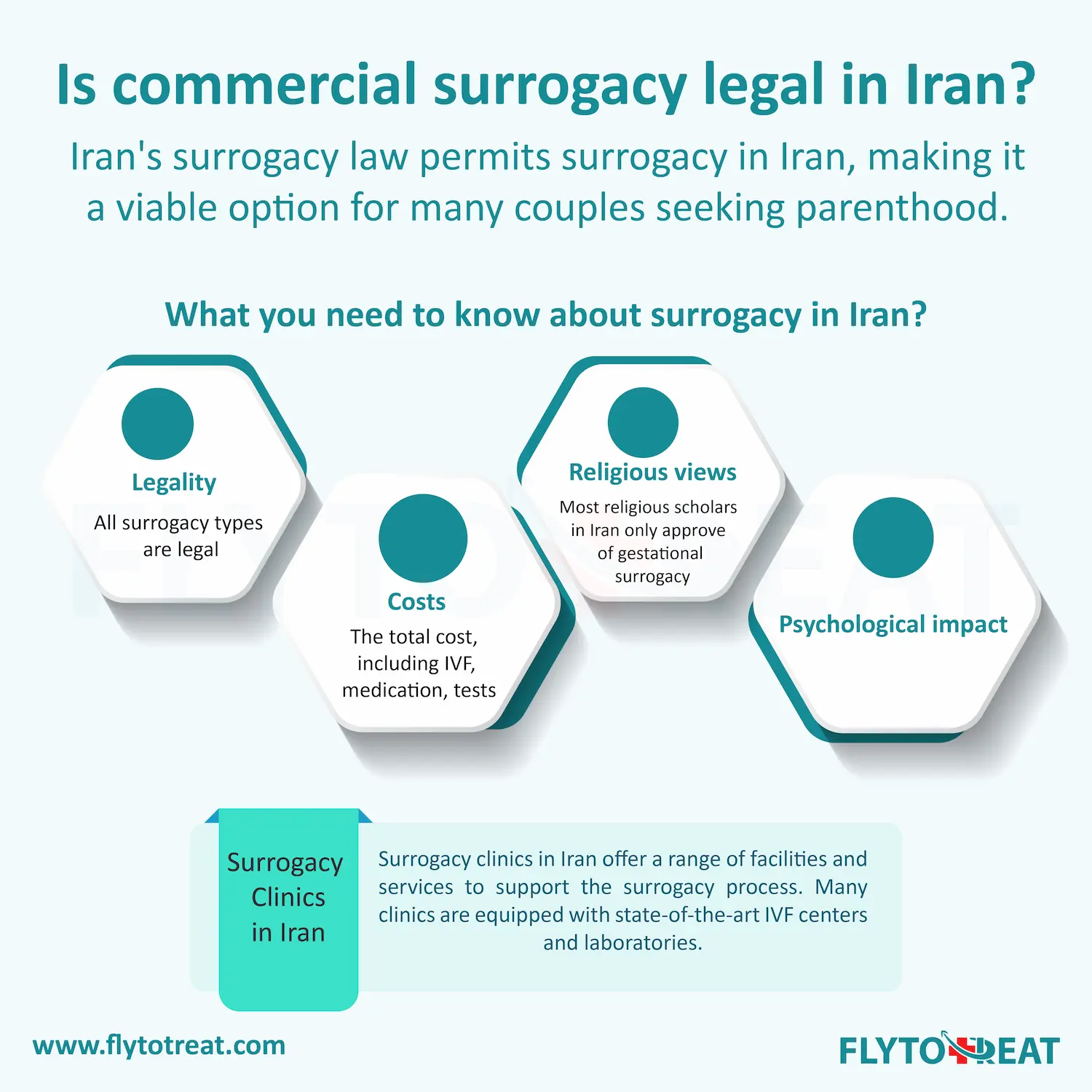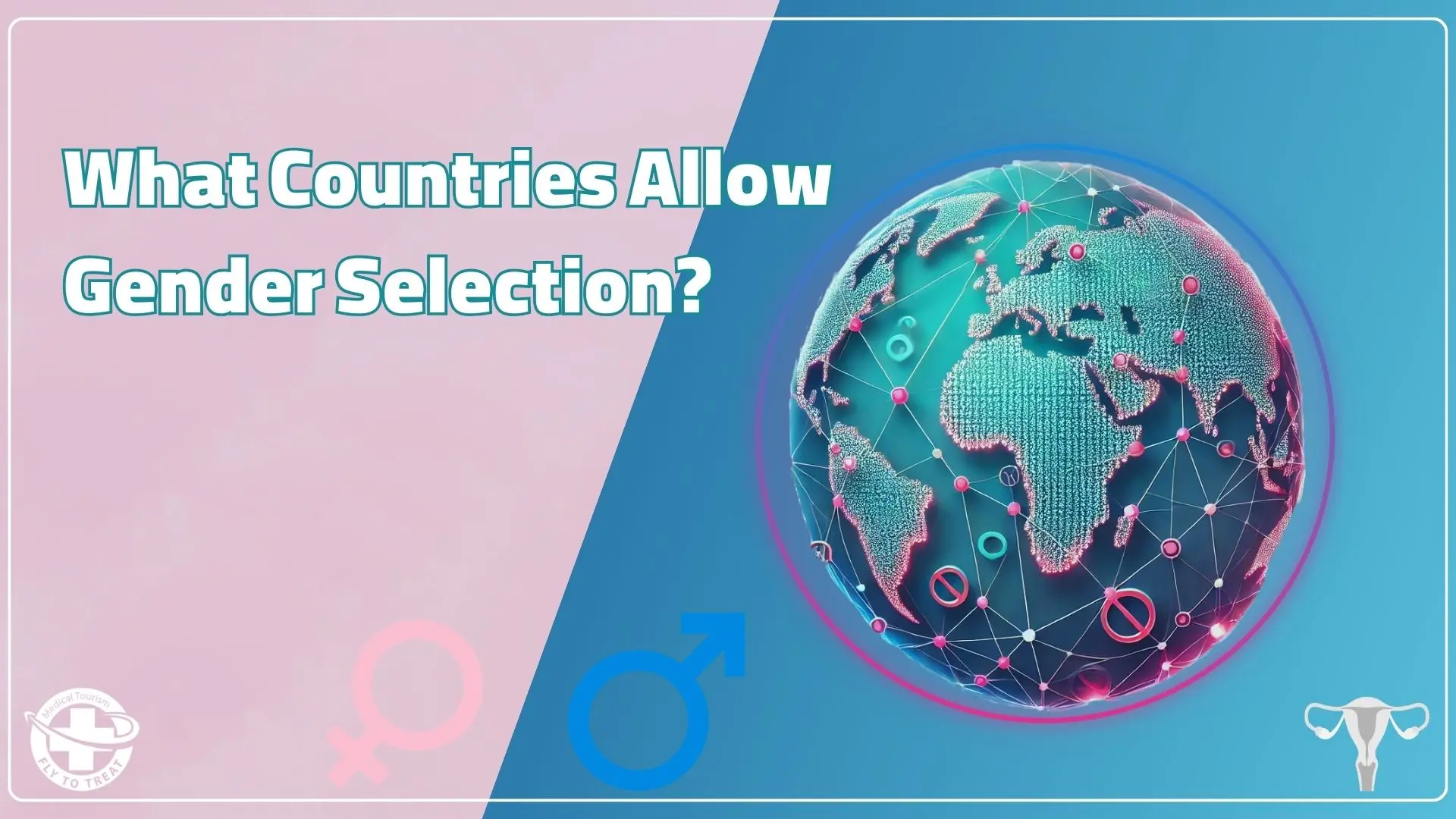
Is Commercial Surrogacy Legal in Iran?
It is essential to understand surrogacy in Iran for intended parents considering this route to parenthood. This article by FlyToTreat will provide comprehensive answers to crucial questions like "What do you need to know about surrogacy in Iran?" "How do you rely on Iranian surrogates?" and "Is surrogacy legal in Iran?" We'll explore the legality, costs, and the best surrogacy clinics in Iran, offering a clear picture of what you can expect.
Table of Contents
Iran Surrogacy Requirements
Islamic law in Iran permits surrogacy, and intended parents and couples from both Iran and other countries can use it. To guarantee an efficient and legal surrogacy procedure, it is imperative to adhere to the legal framework and standards.
The following are Iran's primary legal requirements for surrogacy:
Surrogacy Legal Requirements in Iran
Intended parents should carefully follow legal procedures to ensure a smooth surrogacy journey. Some of these legal rules considered as Iran surrogacy requirements are as follows:
1. Only heterosexual married couples can apply for surrogacy.
2. Signing a legal contract is mandatory for the intended parents and the surrogate mother.
3. Once the surrogacy agreement is completed, the Iranian judicial system recognizes the intended parents as the child's legal guardians.
4. Surrogacy is not allowed for single parents, same-sex couples, or unmarried individuals.
5. Foreigners must comply with Iranian legal procedures to secure their baby's parental rights and travel documents.
Medical and Health Requirements for Intended Parents
Intended parents must meet specific medical guidelines and health conditions before proceeding with surrogacy in Iran, such as the following requirements:
• A recommendation letter from a gynecologist confirming the necessity of surrogacy is required.
• Parents should be free from infectious diseases such as HIV/AIDS, hepatitis, and syphilis.
• Intended parents must not have any drug addiction or health issues that could affect their ability to raise a child.
• A medical examination and fertility assessment are mandatory before starting the process.
You may also want to read: "What is Egg Donation Process?"
Requirements for Surrogate Mothers in Iran
To ensure a successful and safe pregnancy, the surrogate mother must meet some criteria as well. In the following, we have listed some of the conditions and criteria for surrogate mothers:
- A surrogate mother must be between 21 and 35 years old.
- She should be married and have had at least one previous healthy pregnancy.
- She must be in good physical and mental health.
- A surrogate mother should not have chronic health issues or conditions that could complicate pregnancy, as well as undergo infectious disease screening for HIV, hepatitis, syphilis, and other conditions.
- She should have a healthy uterus, confirmed by an ultrasound and gynecological exam.
Surrogacy Clinics in Iran
Surrogacy clinics in Iran offer a range of facilities and services to support the surrogacy process. Many clinics are equipped with state-of-the-art IVF step by step centers and laboratories. If you ask, Is Iran good for IVF? You should know that some larger clinics feature isolated floors for various procedures, including surgeries and births. Additionally, these clinics often provide beautifully decorated ateliers for taking pictures of newborns, with themes customized for each gender.
Iran surrogacy options include some of the best surrogacy clinics in Iran, known for their comprehensive facilities. The focus on providing specialized areas for different stages of the surrogacy process ensures a high standard of care. Suppose you're considering using a gestational carrier in Iran. In that case, you'll find clinics that cater to all aspects of surrogacy with great attention to detail.

What do you need to know about surrogacy in Iran?
Here's what you need to know about surrogacy in Iran:
• Legality: All surrogacy types are legal, and there's no legal prohibition on traditional or gestational arrangements.
• Costs: The total cost, including IVF, medication, tests, and the contract, is around $18,500. Altruistic surrogacy is also possible, but only if a family member is willing to help without monetary benefit.
• Religious views: Most religious scholars in Iran only approve of gestational surrogacy.
• Psychological impact: Surrogacy is considered a high-risk psychological experience, and some say that surrogate mothers should receive special consultations before making a decision. Surrogate mothers in Iran receive world-class care and they will take US and Euro-made supplements.
While there are no specific laws, some say that comprehensive laws are needed to protect the rights and health of children, as well as the dignity of women.
How to Rely on Iranian Surrogates?
Relying on Iranian surrogates involves several steps to ensure a smooth and successful surrogacy experience. Surrogacy in Iran is facilitated by top-tier clinics and a supportive legal environment, making it a reliable option for intended parents. Here are some questions you may ask:
• What are reputable Iranian surrogacy institutions? Start by identifying institutions and the best surrogacy clinics in Iran. These clinics often have experienced staff, advanced medical technology, and comprehensive support systems. Contact our professional consultants to learn more about surrogacy in Iran.
• What is the Iranian legal framework for surrogacy? Iran has a supportive legal framework for surrogacy, making it a safe choice for intended parents. Ensure that all legal documents and agreements are thoroughly reviewed. We will delve into this aspect further in this article.
• What is the medical screening process for Iranian surrogates? Iranian surrogates undergo rigorous medical and psychological screening to ensure they are fit for the process. Their doctors will monitor them thoroughly to ensure they consume their supplements regularly.
With proper research and communication, you can confidently rely on Iranian surrogates and the country's medical infrastructure to support your surrogacy journey.
Iran Surrogacy law
Iran's surrogacy law permits surrogacy in Iran (aka commercial surrogacy), making it a viable option for many couples seeking parenthood. The legal framework allows gestational carriers in Iran, where the surrogate has no genetic link to the child, which ensures clear legal standing for the intended parents.
Surrogacy clinics in Iran are regulated and offer comprehensive services, including legal, medical, and psychological support. These clinics ensure that both the surrogate and the intended parents are well-informed and protected throughout the process.
Iran's favourable surrogacy laws have attracted international attention, with many couples from around the globe considering surrogacy package in Iran as a route to parenthood.
The best surrogacy clinics in Iran are known for their high standards and success rates, making them a popular choice for those seeking surrogacy services.
Overall, Iran's surrogacy laws provide a supportive environment for surrogacy arrangements, ensuring legal protection and support for all parties involved.
Cost of Surrogacy in Iran
The cost of surrogacy in Iran is considerably lower compared to many Western countries, making it an attractive option for many intended parents. It offers various packages to suit different needs and budgets. There are three main types of surrogacy packages available:
• Surrogacy Normal in Iran: This package includes essential medical services required for the surrogacy process.
• Surrogacy Success in Iran: This option offers additional medical support to increase the chances of a successful pregnancy.
• Surrogacy Guaranteed in Iran: This comprehensive package ensures successful surrogacy with a guarantee, covering all necessary medical procedures and more.
Choosing the best package depends on your specific needs and budget. Iran surrogacy is a cost-effective option, with surrogacy clinics in Iran providing high-quality services and experienced professionals. This makes it a viable choice for many international couples seeking a gestational carrier in Iran.
Please Check the Surrogacy Cost in Iran to see the exact services and costs.
conclusion
In summary, the surrogacy Iran framework offers a reliable and cost-effective solution for those looking to expand their families. With FlyToTreat, you can navigate the complexities of surrogacy in Iran with confidence, knowing that top-tier clinics and a favourable legal environment support you. Whether you are curious about the gestational carrier in Iran or need detailed information on the entire process, this guide is your comprehensive resource for making informed decisions.
MEDICALLY REVIEWED BY: Dr. Ali Bazazi
AUTHOR: FlytoTreat's team of Authors
27 July 2024 - Updated At: 19 February 2025
Related Articles
Related Services
Comment
















